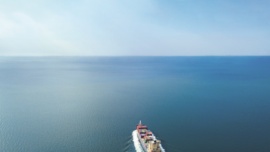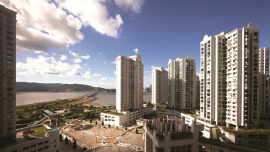João Santos [email protected] The time has come for Macau to diversify the entertainment industry beyond gaming as the golden days of VIP spending are over. In an interview with Business Daily, veteran Union Gaming Research analyst Grant Govertsen says that not even casino operators were expecting the fall in gaming revenues to be this “painful” In April last year gaming revenue increased 10.6 per cent year-on-year and the industry was expanding. Did you ever imagine the situation would be so different this year? No. We were actually one of the first analysts to downgrade the stocks but we never thought it would be this bad. We thought the VIP segment would be soft for a while but that it would probably come back by the end of last year or something like that. But clearly it was not the case and the mass market also worsened, particularly at the premium mass level, which we were not expecting. Looking back now it may make sense but I don’t think that even casino operators expected it to be this painful as it certainly has become. The slowdown of the industry has been mainly driven by the declining VIP segment. Will VIP revenue ever return to 2013 and early 2014 levels? I’d say that some of it will definitely come back but a lot of it won’t. The declines we’ve seen have been very sharp and drastic… In another words, it hasn’t been like rolling down a hill. It has been more like going off a cliff. As the revenue has gone down it has been mainly politically driven because of the anti-corruption crackdown and because Macau has become too toxic. You don’t want to be known as someone going to Macau. At some point the anti-corruption crackdown in China will likely slow down and then some of the VIP gamblers will come back. I think this will be very quick. As soon as word gets out that it’s O.K. to come to Macau again, rather than a gradual increase I think it will be a very sharp increase. The People’s Bank of China has taken some measures in order to increase liquidity in Mainland China’s economy. While this measure may help the Chinese economy, do you believe it will impact the gaming sector in Macau? Normally, it should have a positive impact on Macau. Typically, if the PBoC lowers the required reserves, which increases liquidity, usually there’s a six to nine month lag before you see the benefits in Macau. PBoC has been doing that recently so in theory it would help Macau later this year. But given the macroeconomic environment we’re operating in, I don’t think it will matter at all. Normally, I would be positive but this time I think it will be nothing. This is because you think Macau is seen as toxic? Exactly. To be quite frank I believe people have the money because they’re going to other places, such as Japan or Korea. They’re spending money everywhere but in Macau. SunCity, one of the largest junket operators, has started to operate in the Philippines. Would you consider this move a threat to the VIP market in Macau? And this month they are starting to take customers to Cambodia, in addition to the Philippines. The reality is that Macau pays junkets the least of all the neighbouring gaming areas. Providing I am a junket, I can make a lot more money in the Philippines, Korea, Cambodia or any other place but Macau. With the junkets suffering financially it’s in their best economic interests to pursue greater returns. But I think most customers are just not willing to gamble. Not only are they avoiding Macau but they’re avoiding other places as well. It’s only a marginal impact with players going elsewhere. The mass market has also been declining during this year. What are the reasons behind this trend? There are two things driving the mass market down. Number one is the same thing as VIP. It’s driven by political considerations. Forget about the grind mass. But all the other, from middle mass to premium mass, most of these people are probably small business owners, not factory workers. They’re small business owners and eventually they feel the same pressure as VIP gamblers. So they think that even if they are clean and not corrupt they consider that coming to Macau is not worth the trouble. The other part is the other opportunities these customers have. Macau has not done much to reinvent itself and each time you come to Macau it’s the same thing. Now it’s easier to get a visa to go to Japan or Korea and these customers are taking advantage of that. I believe these customers at some level became a bit bored with the offerings in Macau. Until the next wave of supply comes online in Macau I’m not sure that there’s anything you can do to solve the problem. The second wave of Cotai opens this week. Macau is preparing to receive more tourists as the number of rooms is increasing. However, infrastructure is delayed. Do you expect growth to be impacted by this? Some things need to be done and some co-ordination needs to happen with the Zhuhai Government to direct more people to the Hengqin and Cotai border gate and to take the pressure off the Peninsula side. That is critical, especially these days with less VIP players coming and more low level mass market coming, which seems to be the future for the time being. It would be great if we had the rail [LRT] running but we don’t. We just have to make do without it. But it’s going to be really important to start putting a lot more people through Cotai. Galaxy got approval for 150 gaming tables, having requested 400 for Phase II. Are gaming tables an issue for the market at this moment? Today it [gaming tables] isn’t an issue. Demand is off and if a casino is given 150 gaming tables it’s probably enough because I think there’re enough tables at their existing properties that are underutilized which they can move it. It’s okay for now. In an environment that Macau is starting to recover then you will have to wonder whether it is enough but for the time being it’s sufficient. What do you expect to be the effect on Galaxy of the opening of Galaxy Macau Phase II and Broadway at Galaxy? I’d love to say that it’s going to reinvigorate the market but I just think it doesn’t matter how great it is. The demand story – because of the anti-corruption crackdown – is just weak. I believe people will still continue to hesitate before coming to Macau. There may be a near-term splash but the overall market environment is just too soft. Whatever comes online at this point won’t make a difference. Let’s jump forward to 2017, when all the Cotai projects are finally completed. Which operator do you believe will be best positioned? I’d say that MGM will probably be best positioned, simply because they’re the smallest today in terms of supply and when you think about how much they’re increasing their own supply on a percentage basis they’re by far bringing the most amount of new supply online. MGM has probably the most upside potential in terms of taking market share. Another way to think about it is… The future as it stands today will be a lot more lower level mass market customers coming here and the company that’s best positioned to catch them is, of course, Sands. This is because they just have more hotel rooms than anybody and because not all Sands hotel room are 5-star, which is also good. The Parisian theme will be very attractive to the grind mass market customers and so they will do well. Ultimately, I’m still bullish about all the operators but I think that for those reasons those two can be the most successful. But Galaxy already has a good market share and they’re increasing their supply earlier. Why don’t you think this operator will come out on top? They do. But bear in mind that Galaxy has historically been VIP not mass focused and so it will take them some time to build up a mass market programme. If you go even further than 2017 – let’s say 2020 – then I think you have to include Galaxy because they have more land than anybody else and eventually they’ll be able to rival Sands China in terms of the number of hotel rooms and convention space. They could just be as big as Sands in terms of customer numbers and revenue. What is your view on the possibility of the introduction of a cap on Mainland visitors? I certainly understand the frustration on the part of residents. I live here, too, and sometimes it gets crowded and it’s uncomfortable. But my understanding is that Macau doesn’t decide the immigration policy – China does. And for me it’s not clear that China has the appetite to tell its own people that they cannot come to Macau. But what would happen if such a measure was actually implemented? Then that is a problem and revenues will probably go down again. It will all depend on who is going to be told that they cannot come to Macau. If it’s people that are doing parallel trading then it doesn’t matter. If it’s people that are traditional casinos customers then it will matter. But I think it will be very complicated to implement a cap and to decide who can come to Macau and who cannot. What impact do you expect the full smoking ban to have on the sector when it comes into effect? This should have a material negative impact on casino revenues and therefore on government revenue. Thus is a policy that they have decided upon. In other markets we’ve seen gaming revenues decline 10 to 15 per cent when they implemented a smoking ban. I don’t think it will be that bad here. Non-gaming investments can prepare the future of Macau because as you mentioned people may be bored with the territory… This non-gaming model has been successful in a lot of other destination markets, like Las Vegas and Singapore, and it works. It’s going to be impossible for Macau to diversify away from an entertainment destination. But it can diversify away from only gaming and it needs to. The reality is if we only have gaming in Macau and we only have a little bit of entertainment that’s not good enough because Chinese people can go somewhere else and they are going, like Japan and Korea where there are a lot of entertainment options, and food and beverage. Macau definitely needs to reinvent itself to keep interesting and keep people coming back. Las Vegas has reinvented itself time and time again. They invested a lot of capital to do so but they had to or else people would stop going. For the first time ever Macau is facing that same dilemma. Can Macau ever get to a point where it generates more revenue from non-gaming than from gaming? No. That would take decades and decades to have a majority of revenue coming from non-gaming. But there’s almost none today so you can only go up from here. Eventually, it will be a bigger component but I think it’s still going to be a minority for a long time. It’s just that the gaming revenues are so big that’s going to be hard to catch up. Union Gaming has opened an office in Hong Kong. What projects does the company have in Asia? What we’re trying to do in Asia is replicate what we’ve done in the United States, which is literally being a full service investment, banking and securities firm. Today in Asia we’ve been based in Macau and [conducted] equity research so we’ve been rating and recommending trading stocks. However, we haven’t had the advisory and banking ability because we weren’t in Hong Kong and were not licensed by the Securities and Futures Commission. Now we are, and this will allow us to participate in generic advisory. It just allows us to offer all our products in Asia as we’ve been doing for years now in the United States. N.B: Grant Govertsen is an analyst for Union Gaming Research in Macau, prior to which he spent 8 years on Wall Street as a gaming analyst. He has worked for Deutsche Bank and Coopers & Lybrand’s Financial Advisory Services group.
—























